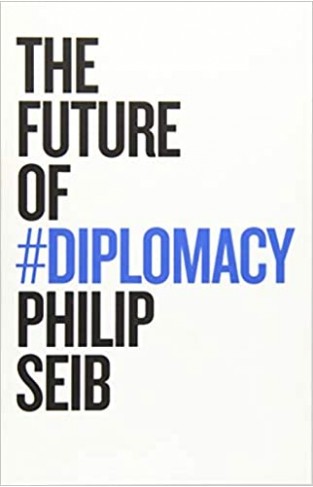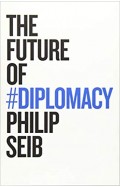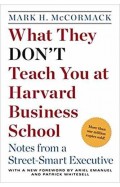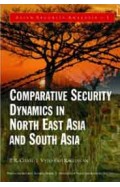The Future of Diplomacy
By: Phillip seib
-
Rs 3,235.50
- Rs 3,595.00
- 10%
You save Rs 359.50.
Due to constant currency fluctuation, prices are subject to change with or without notice.
Never before has diplomacy evolved at such a rapid pace. It is being transformed into a global participatory process by new media tools and newly empowered publics. Public diplomacy has taken center-stage as diplomats strive to reach and influence audiences that are better informed and more assertive than any in the past. In this crisp and insightful analysis, Philip Seib, one of the world s top experts on media and foreign policy, explores the future of diplomacy in our hyper-connected world. He shows how the focus of diplomatic practice has shifted away from the closed-door, top-level negotiations of the past. Today s diplomats are obliged to respond instantly to the latest crisis fueled by a YouTube video or Facebook post. This has given rise to a more open and reactive approach to global problem-solving with consequences that are difficult to predict. Drawing on examples from the Iran nuclear negotiations to the humanitarian crisis in Syria, Seib argues persuasively for this new versatile and flexible public-facing diplomacy; one that makes strategic use of both new media and traditional diplomatic processes to manage the increasingly complex relations between states and new non-state political actors in the 21st Century
Never before has diplomacy evolved at such a rapid pace. It is being transformed into a global participatory process by new media tools and newly empowered publics. Public diplomacy has taken center-stage as diplomats strive to reach and influence audiences that are better informed and more assertive than any in the past. In this crisp and insightful analysis, Philip Seib, one of the world s top experts on media and foreign policy, explores the future of diplomacy in our hyper-connected world. He shows how the focus of diplomatic practice has shifted away from the closed-door, top-level negotiations of the past. Today s diplomats are obliged to respond instantly to the latest crisis fueled by a YouTube video or Facebook post. This has given rise to a more open and reactive approach to global problem-solving with consequences that are difficult to predict. Drawing on examples from the Iran nuclear negotiations to the humanitarian crisis in Syria, Seib argues persuasively for this new versatile and flexible public-facing diplomacy; one that makes strategic use of both new media and traditional diplomatic processes to manage the increasingly complex relations between states and new non-state political actors in the 21st Century
Zubin Mehta: A Musical Journey (An Authorized Biography)
By: VOID - Bakhtiar K. Dadabhoy
Rs 840.00 Rs 1,050.00 Ex Tax :Rs 840.00
What They Dont Teach You at Harvard Business School: Notes from a StreetSmart Executive
By: Mark H. Mccormack
Rs 3,795.00 Ex Tax :Rs 3,795.00
Comparative Security Dynamics in North East Asia and South Asia English Spanish French Italian German Japanese Chinese Hindi and Korean Edition
By: N/A
Rs 1,125.00 Rs 1,250.00 Ex Tax :Rs 1,125.00
Comandante: Inside Hugo Chavezs Venezuela
By: Rory Carroll
Rs 1,356.00 Rs 1,695.00 Ex Tax :Rs 1,356.00
The Origins of Political Order From Prehuman Times to the French RevolutioN
By: Francis Fukuyama
Rs 4,495.00 Ex Tax :Rs 4,495.00
What They Dont Teach You at Harvard Business School: Notes from a StreetSmart Executive
By: Mark H. Mccormack
Rs 3,795.00 Ex Tax :Rs 3,795.00
Comparative Security Dynamics in North East Asia and South Asia English Spanish French Italian German Japanese Chinese Hindi and Korean Edition
By: N/A
Rs 1,125.00 Rs 1,250.00 Ex Tax :Rs 1,125.00
Comandante: Inside Hugo Chavezs Venezuela
By: Rory Carroll
Rs 1,356.00 Rs 1,695.00 Ex Tax :Rs 1,356.00
No recently viewed books available at the moment.
Zubin Mehta: A Musical Journey (An Authorized Biography)
By: VOID - Bakhtiar K. Dadabhoy
Rs 840.00 Rs 1,050.00 Ex Tax :Rs 840.00
What They Dont Teach You at Harvard Business School: Notes from a StreetSmart Executive
By: Mark H. Mccormack
Rs 3,795.00 Ex Tax :Rs 3,795.00
Comparative Security Dynamics in North East Asia and South Asia English Spanish French Italian German Japanese Chinese Hindi and Korean Edition
By: N/A
Rs 1,125.00 Rs 1,250.00 Ex Tax :Rs 1,125.00
Comandante: Inside Hugo Chavezs Venezuela
By: Rory Carroll
Rs 1,356.00 Rs 1,695.00 Ex Tax :Rs 1,356.00














-120x187.jpg?q6)













-120x187.jpg?q6)


-120x187.jpg?q6)